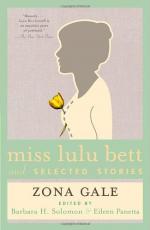When they were gone Lulu felt an instant liberation. She turned aimlessly to the garden and dug round things with her finger. And she thought about the brightness of that Chautauqua scene to which Ina and Dwight had gone. Lulu thought about such gatherings in somewhat the way that a futurist receives the subjects of his art—forms not vague, but heightened to intolerable definiteness, acute colour, and always motion—motion as an integral part of the desirable. But a factor of all was that Lulu herself was the participant, not the onlooker. The perfection of her dream was not impaired by any longing. She had her dream as a saint her sense of heaven.
“Lulie!” her mother called. “You come out of that damp.”
She obeyed, as she had obeyed that voice all her life. But she took one last look down the dim street. She had not known it, but superimposed on her Chautauqua thoughts had been her faint hope that it would be to-night, while she was in the garden alone, that Ninian Deacon would arrive. And she had on her wool chally, her coral beads, her cameo pin....
She went into the lighted dining-room. Monona was in bed. Di was not there. Mrs. Bett was in Dwight Herbert’s leather chair and she lolled at her ease. It was strange to see this woman, usually so erect and tense, now actually lolling, as if lolling were the positive, the vital, and her ordinary rigidity a negation of her. In some corresponding orgy of leisure and liberation, Lulu sat down with no needle.
“Inie ought to make over her delaine,” Mrs. Bett comfortably began. They talked of this, devised a mode, recalled other delaines. “Dear, dear,” said Mrs. Bett, “I had on a delaine when I met your father.” She described it. Both women talked freely, with animation. They were individuals and alive. To the two pallid beings accessory to the Deacons’ presence, Mrs. Bett and her daughter Lulu now bore no relationship. They emerged, had opinions, contradicted, their eyes were bright.
Toward nine o’clock Mrs. Bett announced that she thought she should have a lunch. This was debauchery. She brought in bread-and-butter, and a dish of cold canned peas. She was committing all the excesses that she knew—offering opinions, laughing, eating. It was to be seen that this woman had an immense store of vitality, perpetually submerged.
When she had eaten she grew sleepy—rather cross at the last and inclined to hold up her sister’s excellencies to Lulu; and, at Lulu’s defence, lifted an ancient weapon.
“What’s the use of finding fault with Inie? Where’d you been if she hadn’t married?”
Lulu said nothing.
“What say?” Mrs. Bett demanded shrilly. She was enjoying it.
Lulu said no more. After a long time:
“You always was jealous of Inie,” said Mrs. Bett, and went to her bed.
As soon as her mother’s door had closed, Lulu took the lamp from its bracket, stretching up her long body and her long arms until her skirt lifted to show her really slim and pretty feet. Lulu’s feet gave news of some other Lulu, but slightly incarnate. Perhaps, so far, incarnate only in her feet and her long hair.




